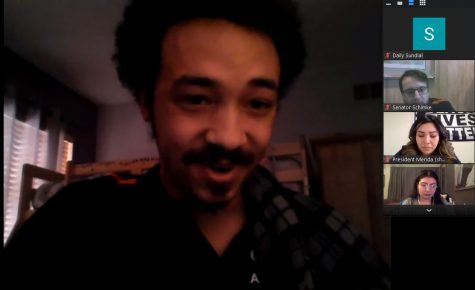AS votes to distribute $135,000 of surplus fees to basic needs programs
After weeks of discussion, AS votes to disperse $135,000 surplus to campus organizations, grants and scholarships.
December 9, 2020
During their last meeting of the semester on Monday, the AS Senate voted to approve the finance committee’s recommendation to authorize the use of $135,000 of surplus AS fees to fund current students’ basic needs.
The surplus was identified after the AS 2020-2021 fiscal year budget was determined. Because of CSUN’s move to online instruction, AS anticipated a lack of revenue and cut costs accordingly, resulting in a $412,000 surplus. A portion of AS’s revenue is generated by the university.
Over the past couple of weeks, AS has debated how the excess funds would be used. One option was to provide students with a rebate, which would have resulted in each student receiving $5.71.
Through Senate discussion and two finance committee meetings, it was determined that a one-time rebate to students would not be an effective use of funds. They decided that redistributing the funds into campus programs would better help the university and its students.
The AS finance committee recommended redirecting approximately one-third of the anticipated surplus — about $135,000 — to critical student needs, such as basic needs programs, the food pantry and various grants and scholarships.
Out of the $135,000, roughly $50,000 will go to the MataCare Grant, and $20,000 will go to DACA and AB540 students. Another $30,000 will go to scholarship endowments that provide annual grants to students.
The remaining $35,000 will be distributed between the CSUN Food Pantry and emergency student housing.
After enrollment numbers are finalized in the spring, the committee recommended awarding another third of the surplus toward these programs and grants. Any remaining amounts will be placed in a reserve savings.
The recommendation was presented before the senate to vote on and passed with a majority vote.
Michael Meeks, the senator and chair of the External Affairs Committee, spoke to the senate about a motion that came out of the committee to approve an AS response to criminal justice reform events.

The resolution is a response to the AS sponsored webinar called “Criminal Justice: Fixing a Broken System,” that Meeks organized earlier in the semester. The event came after the death of George Floyd and the protests and social unrest that sparked after that. Meeks set out to collect feedback from panelists and participants to gauge the campus climate and to educate the senate to take an actual stance on social justice reform.
In the response, the resolution states that AS seeks to review and revamp CSUN’s Police Department to institute new safety programs on campus instead of students relying on the university police.
The statement also said that AS calls for fundamental reform of local law enforcement and that money that is intended to go toward policing services should be redistributed to other public safety measures.
Senator of Engineering and Computer Science Zachary Schimke brought up concerns about the language of some of the resolution’s statements, specifically remarks about divesting funds from CSUN’s PD.
Schimke also said the resolution addresses law enforcement in a broad spectrum and does not explicitly point out how to improve CSUN’s campus police department.
“I honestly think that CSUN’s police department is not one of the bad actors out there,” Meeks said. “I think our chief is legitimately concerned about these things and is trying to push us in a better direction.
Senator Adriana Coronado, who represents the College of Humanities, said that this resolution is not targeted to one specific police agency.
“This is more of a systemic issue, rather than just one police station may not have done their job,” Coronado said. “We expect all police agencies to do better.”
Meeks supported Coronado’s comment and said that the resolution is intended to examine the practices among police departments because there are problematic issues that occur. He said that resolutions like this will help AS going forward because it will establish a standard for how the group approaches social justice issues.
“The university is a creative place where we innovate the solutions that society can put in place one day,” Meeks said.
Schimke moved to amend the language of the resolution, however, the motion was not seconded by another senator, so it could not be voted on.
“We’re having an old school senate debate. What a cool way to leave,” said Meeks, who will be stepping down as senator at the end of the fall semester.
After a back and forth discussion between Meeks and Schimke, the motion calling for an official response from AS on criminal justice reform went before the senate to vote and passed with a majority vote.
The resolution will be sent to various campus decision-makers such as President Dianne. F. Harrison and the campus administration, Gregory Murphy, the chief of police at CSUN, the Los Angeles Police Department and local policymakers in California.
Another motion came out of the External Affairs Committee condemning anti-Semitism.
Senator Jonathan Hay, who developed the resolution, spoke to the senate about the background of the resolution.
Hay said that it is important that AS leadership understands that the Jewish community still needs support in fighting anti-Semitism. Hay provided the senate with supporting documents that show the continual rise of anti-Semitic acts within the U.S.
“We want to make sure that as Jewish CSUN students, we have allies in AS leadership,” Hay said. “We want to know that there are people who will stand next to us when times may hit the Jewish community.”
The resolution states that AS adopts the definition of anti-Semitism as hostility toward or discrimination against Jews as a religious, ethnic or racial group. It also says that AS condemns all forms of anti-Semitic behavior or language no matter what political party it is from and that the senate is committed to fighting all forms of antisemitism on campus.
The motion out of the committee was voted upon by the senate and the resolution passed with a majority vote. The resolution will be sent to various interested parties, such as President Harrison, President-elect Erika D. Beck and to Hillel 818, the center for Jewish campus life at CSUN.
Under the new business section of the senate meeting, a club constitution for the CSUN Young Democratic Socialists of America was voted on.
According to the club constitution, CSUN YDSA is formed to “better realize equity, justice, and democracy, beginning in local communities but extending beyond CSUN.”
The YDSA is a national organization of recognized campus chapters that has several hundred activists.
The senate voted to approve the club’s constitution through a majority vote.
Two new appointments were approved during the meeting. The first appointment was for David Tahoor as an associate justice for the AS Judicial Court, and the second appointment was for graduate student Kiana Requena as senator for the College of Education.
Both appointees will begin their AS roles immediately.
President Rose Merida concluded the meeting by thanking the senate and the various faculty advisors for a successful semester.
“Let us know if we can be a support in any way possible, and again shout out to everyone for your hard work,” Merida said. “For those of you who are leaving us this semester, we’re going to miss you.”
The next AS meeting will be held during the spring 2021 semester.
